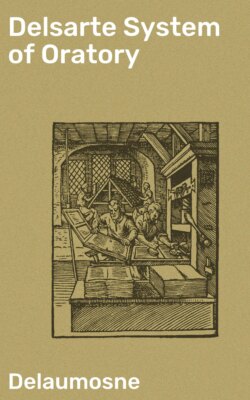Читать книгу Delsarte System of Oratory - Delaumosne - Страница 34
На сайте Литреса книга снята с продажи.
Number of Gestures.
ОглавлениеMany reasons go to prove that gestures need not be multiplied:
A.--We are moved by only one sentiment at a time; hence it is useless to multiply gestures.
B.--But one gesture is needed for the expression of an entire thought; since it is not the word but the thought that the gesture must announce; if it expressed only the word, it would be trivial and mean, and also prejudicial to the effect of the phrase.
In these phrases: "What do you seek in the world, happiness? It is not there," that which first strikes us is the absence of happiness. Gesture must indicate it in advance, and this should be the dominating movement.
The intelligent man makes few gestures. To multiply gestures indicates a lack of intelligence. The face is the thermometer of intelligence. Let as much expression as possible be given to the face. A gesture made by the hand is wrong when not justified in advance by the face. Intelligence is manifested by the face. When the intelligent man speaks, he employs great movements only when they are justified by great exaltation of sentiment; and, furthermore, these sentiments should be stamped upon his face. Without expression of the face, all gestures resemble telegraphic movements.
C.--The repeated extension of the arms denotes but little intelligence, little suppleness in the wrist and fingers. The movement of a single finger indicates great finesse.
It is easy to distinguish the man of head, heart and actions. The first makes many gestures of the head; the second many of the shoulders; the last moves the arms often and inappropriately.
D.--Gesture is allowable only when an ellipse of the word or phrase admits of an additional value.
E.--Effects must not be multiplied; this is an essential precaution. Multiplied movements are detrimental when a graver movement is awaited.
F.--The orator is free to choose between the rôle of actor or that of mere spectator or narrator. Neither the one nor the other can be forced upon him. The actor's rôle arises not from intelligence but simply from instinct. The actor identifies himself with the personages he represents. He renders all their sentiments. This rôle is the most powerful, but, before making it the object of his choice, there must be severe study; he must not run the risk of frivolity.
We can dictate to the preacher and mark out his path. He must not be an actor, but a doctor. Hence his gestures must never represent the impressions of those of whom he speaks, but his own. Hence he should proportion the number of his gestures to the number of his sentiments.
G.--If the orator would speak to any purpose, he must bring back his discourse to some picture from nature, some scene from real life.
There must be unity in everything; but a rôle may be condensed in two or three traits; therefore a great number of gestures is not necessary.
Let it be carefully noted: the expression of the face should make the gesture of the arms forgotten. Here the talent of the orator shines forth. He must captivate his public in such a way that his arm gestures will be ignored. He must so fascinate his auditors that they cannot ask the reason of this fascination, nor remark that he gesticulates at all.
H.--Where there are two gestures in the same idea, one of them must come before the proposition, the other in its midst.
If there is but one gesture and it precedes the proposition, the term to which it is applied must be precisely indicated.
For example: Would he be sensible to friendship? Although friendship may in some degree be qualified as the indirect regimen, gesture should portray it in all its attributes.
